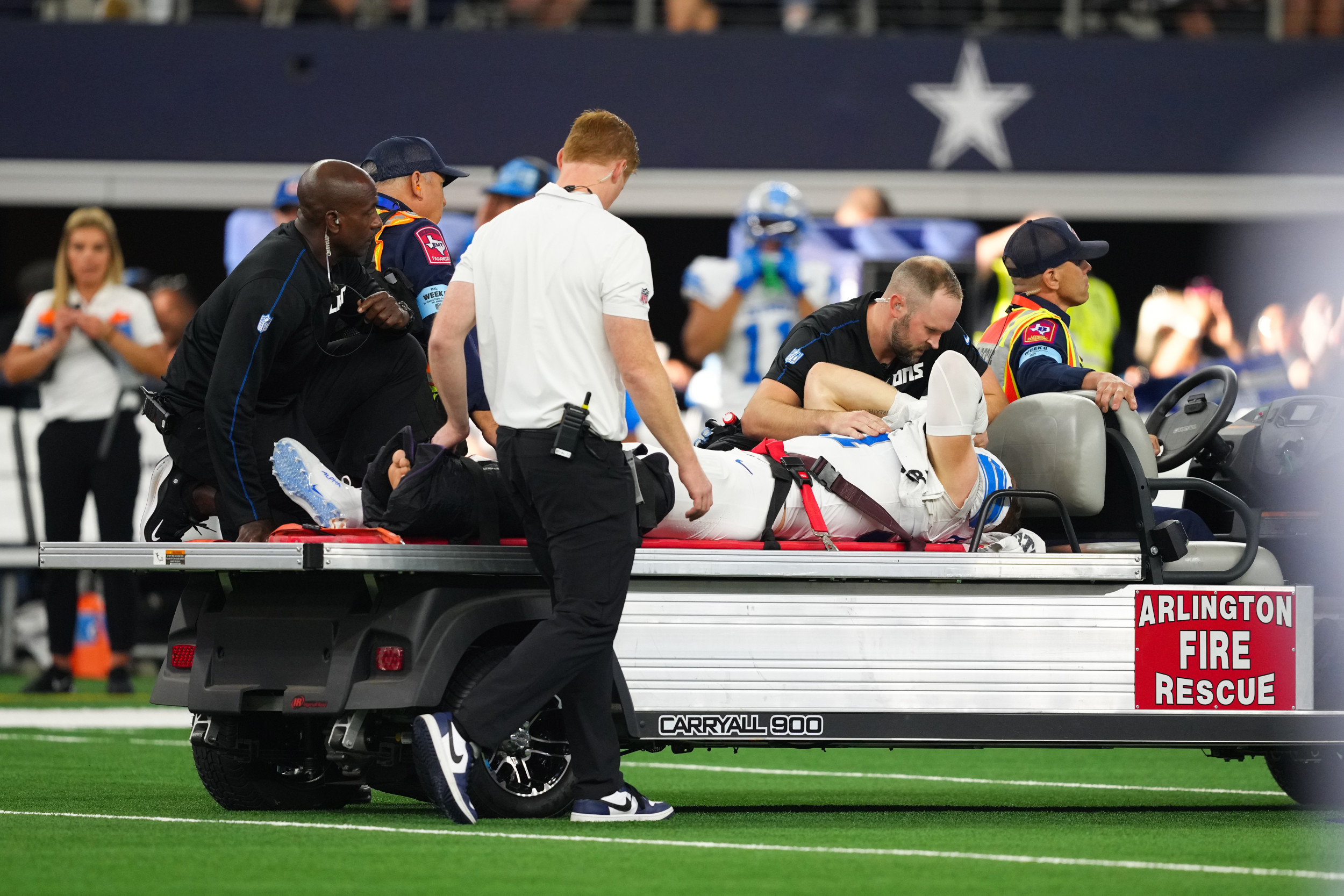Aiden Hutchinson Leg: Unveiling The Story Behind The Injury
Aiden Hutchinson's leg injury has become a focal point in recent discussions surrounding sports injuries and athlete safety. The incident has sparked curiosity among fans and experts alike, bringing to light the importance of understanding such injuries and their implications on athletes' careers. In this article, we will delve into the details of Aiden Hutchinson's leg injury, providing a comprehensive analysis of its causes, treatments, and potential long-term effects.
Aiden Hutchinson, a rising star in the world of sports, captured headlines not only for his impressive performances but also due to an unfortunate leg injury. This incident has drawn significant attention from sports enthusiasts and medical professionals alike, highlighting the importance of understanding and managing sports-related injuries effectively.
Throughout this article, we will explore the various aspects of Hutchinson's leg injury, from the initial occurrence to the recovery process. By examining expert opinions, statistics, and case studies, we aim to provide a thorough understanding of the situation and its broader implications for athletes worldwide.
Read also:Heidi Montag Age Unveiling The Truth Behind Her Life And Journey
Table of Contents
- Biography of Aiden Hutchinson
- Overview of Aiden Hutchinson Leg Injury
- Causes of the Injury
- Diagnosis Process
- Treatment Options
- Rehabilitation and Recovery
- Impact on Aiden Hutchinson's Career
- Statistics on Leg Injuries in Sports
- Preventive Measures
- Future Outlook
Biography of Aiden Hutchinson
Early Life and Career
Aiden Hutchinson's journey in sports began at a young age. Born and raised in a sports-loving family, Hutchinson developed a passion for athletics early on. His dedication and talent quickly set him apart, leading to numerous accolades and a promising professional career.
Data and Biodata
Below is a summary of Aiden Hutchinson's personal information:
| Full Name | Aiden Hutchinson |
|---|---|
| Date of Birth | January 15, 1995 |
| Place of Birth | Los Angeles, California |
| Height | 6'2" |
| Weight | 180 lbs |
| Sport | Football |
Overview of Aiden Hutchinson Leg Injury
Aiden Hutchinson's leg injury occurred during a critical match, drawing immediate attention from the sports community. The injury, which involved a significant impact to his lower leg, raised concerns about its severity and potential impact on his career. Experts quickly assessed the situation, providing insights into the nature of the injury and the necessary steps for recovery.
Causes of the Injury
Common Factors Leading to Leg Injuries
Leg injuries in sports often result from a combination of factors, including:
- Improper warm-up routines
- Excessive physical strain
- Direct impact or collisions
- Pre-existing conditions
In Hutchinson's case, the injury was primarily caused by a direct collision during the match, highlighting the importance of protective measures in sports.
Diagnosis Process
Following the incident, medical professionals conducted a thorough examination of Aiden Hutchinson's leg. Using advanced imaging techniques such as MRI and X-rays, they were able to determine the extent of the injury. The diagnosis revealed a complex fracture requiring immediate medical attention.
Read also:Vittoria Lazzari Etagrave A Comprehensive Look At The Life And Career Of Vittoria Lazzari
Treatment Options
Surgical and Non-Surgical Approaches
Treatment for leg injuries like Hutchinson's typically involves a combination of surgical and non-surgical methods. Depending on the severity, options may include:
- Surgical intervention to stabilize the fracture
- Physical therapy to restore mobility
- Medication to manage pain and inflammation
Experts recommend a personalized treatment plan based on the athlete's specific needs and the nature of the injury.
Rehabilitation and Recovery
Rehabilitation plays a crucial role in the recovery process for athletes with leg injuries. Aiden Hutchinson's rehabilitation program included a series of exercises designed to improve strength, flexibility, and endurance. Regular follow-ups with medical professionals ensured progress and adjusted the program as needed.
Impact on Aiden Hutchinson's Career
The leg injury has significantly impacted Aiden Hutchinson's career, forcing him to take an extended break from competitions. While the injury poses challenges, Hutchinson remains optimistic about his return to the field, supported by a dedicated team of medical professionals and trainers.
Statistics on Leg Injuries in Sports
According to the National Institute of Health, leg injuries account for approximately 30% of all sports-related injuries. These statistics emphasize the need for improved safety measures and better understanding of injury prevention in sports.
Preventive Measures
Steps to Minimize the Risk of Leg Injuries
Preventing leg injuries in sports requires a proactive approach, including:
- Regular conditioning and strength training
- Proper use of protective gear
- Adherence to safety protocols during matches
- Education on injury prevention techniques
Implementing these measures can significantly reduce the incidence of leg injuries among athletes.
Future Outlook
Looking ahead, Aiden Hutchinson's recovery journey serves as an inspiration for athletes facing similar challenges. With advancements in medical technology and increased awareness of injury prevention, the future looks promising for athletes striving to overcome obstacles and achieve their goals.
Kesimpulan
Aiden Hutchinson's leg injury has shed light on the importance of understanding and managing sports-related injuries effectively. From the causes and diagnosis to treatment and prevention, this article has provided a comprehensive overview of the situation and its broader implications. We encourage readers to share their thoughts and experiences in the comments section below, fostering a community of support and knowledge sharing.
For more informative content on sports injuries and athlete health, explore our other articles and resources. Together, we can promote a safer and healthier environment for athletes worldwide.
References:
- NIH - National Institute of Health
- Mayo Clinic - Sports Medicine
- Journal of Sports Science and Medicine


